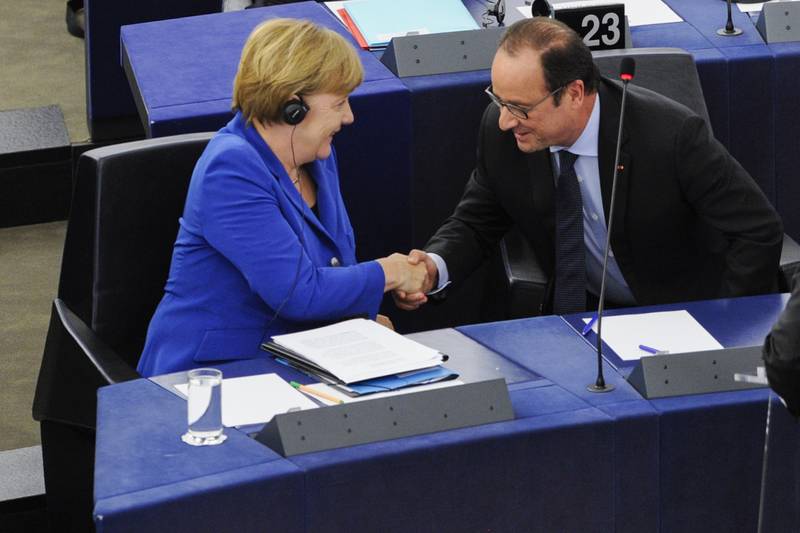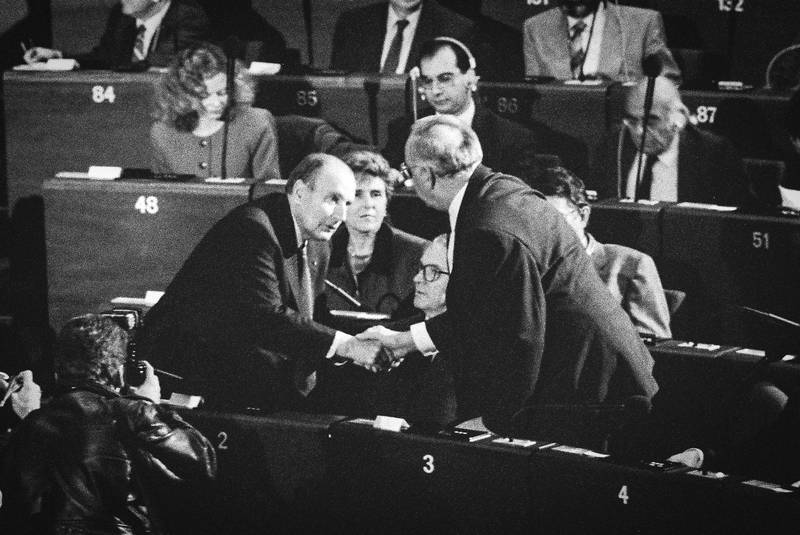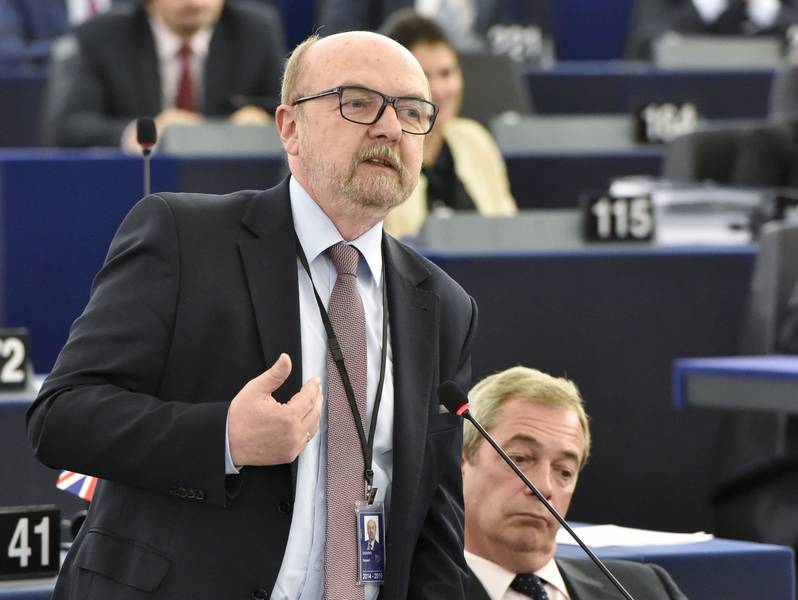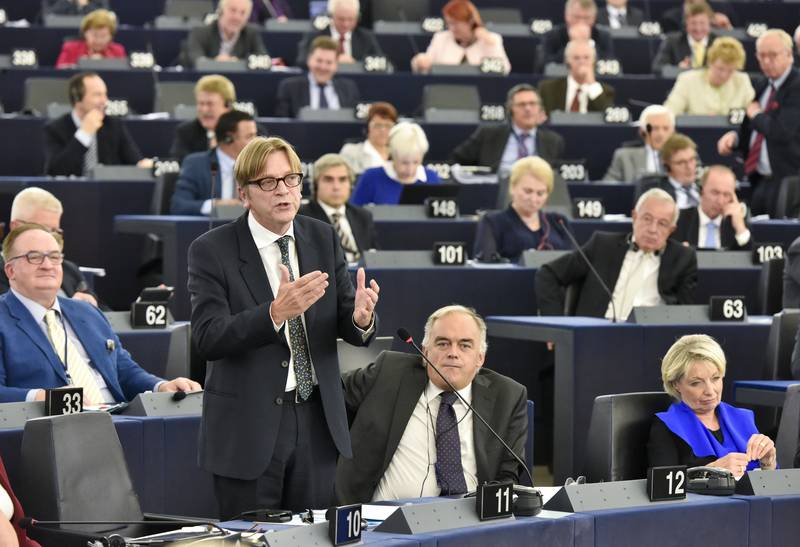From Unification to Disunity and Back Again
Adelina Marini, October 14, 2015
 “Europe of sovereignties and sovereigntism”. "A time to decide – together or goodbye!”. “A federation on the horizon, or just a mirage?”. “Euro-sceptics are killing Europe”. “Hollande and Merkel in a parallel reality”. “Who leads Europe?”. “Merkel and Hollande – the symbol of intergovernmentalism”. Those are other possible headlines for a text about the speeches of German chancellor Angela Merkel and French president François Hollande at the European Parliament last week. The appearance of the leaders of the two founding states of the European Union together in front of MEPs for the first time in almost 26 years was once more loaded with historic expectations. On November 22nd 1989 François Mitterrand and Helmut Kohl appeared in front of a far smaller European Parliament in the eve of the great reunification of Eastern and Western Europe. At that time the challenge was how to integrate the former communist states and the accompanying apprehension from the unknown and at the same time considering the next integration move.
“Europe of sovereignties and sovereigntism”. "A time to decide – together or goodbye!”. “A federation on the horizon, or just a mirage?”. “Euro-sceptics are killing Europe”. “Hollande and Merkel in a parallel reality”. “Who leads Europe?”. “Merkel and Hollande – the symbol of intergovernmentalism”. Those are other possible headlines for a text about the speeches of German chancellor Angela Merkel and French president François Hollande at the European Parliament last week. The appearance of the leaders of the two founding states of the European Union together in front of MEPs for the first time in almost 26 years was once more loaded with historic expectations. On November 22nd 1989 François Mitterrand and Helmut Kohl appeared in front of a far smaller European Parliament in the eve of the great reunification of Eastern and Western Europe. At that time the challenge was how to integrate the former communist states and the accompanying apprehension from the unknown and at the same time considering the next integration move.
“Well, in Berlin on 9 November the onward march of history offered the world a sight which had still seemed unlikely even the day before — the sight of a hole in the wall, that wall which for nearly 30 years had been the very embodiment of the division of our continent” said at the time French President François Mitterrand. “The yearning of Germans in East Berlin and in the GDR for freedom has resulted in the Wall and the barbed wire being breached peacefully” were the words of German Chancellor Helmut Kohl. 26 years later Germany and France were talking of walls again, only this time raised by Eastern Europe. Europe has faced multiple crises, but the true problem is one – disunity forces. This was pointed out by both Angela Merkel and François Hollande, as well as by the leaders of the pro-European political groups. Alas, no solution as to how this is to be overcome came from the two leaders.
My first impression of the appearance of Angela Merkel and François Hollande in Strasbourg on October 7th was of a weak presentation, way below my expectations. On the second and third rerun, however I was able to sift out several extremely powerful messages, wrapped in too many words, obviously aiming to respond to the high expectations that Mitterrand and Kohl set up for Merkel and Hollande. Actually the bar from November 22nd 1989 was further raised afterwards. When one goes back to the black-and-white tapes of their speeches one could feel disappointment again. Both then and now the challenges are greater than any standalone leader, be it the ones of the two most powerful countries in the Union.
If you don't like it, goodbye
François Hollande attempted to list in his speech all the crises that the EU is facing, to make an analysis, to show what is going wrong. He spoke as if he’s holding the presidency of the Council, G7, and G20 simultaneously. Too many words and mostly template phrases that we have been hearing for years, like “We need a strong Europe, more Europe” for example. As was to be expected he spoke of solidarity, of Greece, of being united. Amid the well-worn phrases, however, there were several new wordings showing through, which are a step towards a correct diagnosis, which provides the path to treatment. Sovereignty vs. sovereigntism. According to François Hollande, this is the attempt to turn national sovereignty into a top priority. The solution to European problems is shared sovereignty, not sovereigntism as a synonym to nationalism. Nationalism means war, he quoted his namesake and  predecessor Mitterrand. “Sovereigntism is decline and is just as dangerous”, said the French head of state. We need to move forward, not go back, for going back means an end to the European project.
predecessor Mitterrand. “Sovereigntism is decline and is just as dangerous”, said the French head of state. We need to move forward, not go back, for going back means an end to the European project.
There are parliamentarians here who are not Europeans and who are not aware that we belong to a single community and that we are bound together by the values, which we share, by the history and future that we share. A federation of nation-states must remain on the horizon, stressed Mr Hollande. “The question is do we want to go back to the old system of the 20th century or do we want to go towards a consistent approach for the coming generation, the coming century. I say yes to that”, stated the president. During the debate that followed with political groups’ leaders, among whom was also his rival for the 2017 presidential election Marine Le Pen, François Hollande gained substance and strength. After the speech of Marine Le Pen, who proclaimed herself an anti-Merkelist and in favour of France quitting to follow Germany “blindly”, and the one by Nigel Farage, who announced that the British referendum on EU membership will mark the beginning of the end of the European project, François Hollande burst into a bout of candour and directness that the EU has been needing for years.
“Some people would like to keep Europe as it is, which is not easy to manage. The only road for those who are not convinced of Europe is to leave Europe. There is no other way”. These words were wildly applauded by Marine Le Pen and the MEPs from the United Kingdom Independence Party (UKIP). The next words of the French president, however, made smiles and applauses step aside to make room for surprise. “Leave Europe, leave Schengen and leave democracy if you can, because do you really want to participate in a common space? That’s the question. It’s not abandoning sovereignty. It has nothing to do with sovereigntism. We have to avoid going back to nationalism, populism, extremism which is taking us down the wrong path.” This caused a storm of applause under the approving nod of Angela Merkel, sitting beside him wearing a jacket in the colours of the European flag.
We do not want intergovernmentalism, but it is a fact
The Franco-German engine of the EU was strongly criticised both by Euro-sceptic MEPs and federalists alike for its intergovernmental approach, which seemed to get underlined a number of times in the speeches of the two state leaders. Both Merkel and Hollande stressed repeatedly how successful the Normandy format is, the same that was implemented in the peace negotiations with Russia and the Ukraine. They suggested that they will continue to use it for it proved so successful. “The intergovernmental model is obsolete”, said, however, the leader of the Socialists and Democrats group Gianni Pittella (Italy). "If Europe is humiliated and downgraded to a collection of states for reasons of convenience, that opens a Pandora's box, which contains a wish for separation, for partitioning", he added. What is needed is common diplomacy, common foreign policy, Gianni Pittella believes. Polish MEP from the European Conservatives and Reformists group Ryszard Legutko directly accused Germany and France of domineering.

“But don’t you think that this is at least a part of the problem. That 1-2 countries decide for the rest and we are altogether 28? And 28 is far more than 2”, he said and got a strong round of applause. It was difficult to discern whether he was applauded just by his own, or by MEPs of the full spectrum. “Chancellor Merkel [....], you sometimes forget about the difference between leadership and dominance”, said the MEP. Volatile as ever, the leader of ALDE Guy Verhofstadt (Belgium) fittingly summarised his new book “Europe’s disease” to Angela Merkel and François Hollande just a few days before its official presentation. “What I want to make clear today in this debate is that the origin of every of these crises is exactly the same - it's a lack of common governance. It's a lack of shared sovereignty. It's a lack of unity in Europe”. In order to succeed, Europe needs to change three bad attitudes. First of all an end should be put to a “Europe a-la-carte”, or everyone choosing what they like from Europe. The second is that there is not one union, but a minimum of ten – Schengen, the euro, the European patent, the banking union. Sometimes there are even 28 unions.
Thirdly, an end should be put to the step-by-step approach. Europe needs a quantum leap, said the former Belgian Prime Minister and former candidate leader of the European Commission. “You have a historic responsibility for that”, he added. At the background of loud applause the reactions of the French president and the German chancellor could be read two ways. They looked at each other half smiling and nodded, after which Angela Merkel started jotting something down on the sheet in front of her. This reaction could be read as “This guy is talking some sense, we should consider what he says”. It could also mean, however, “What is this guy babbling about?!”. If you judge by the reactions at the end of the debate, however, it is more likely to be the first one. The German chancellor stated that she will take into consideration all ideas put forward during the debate by the well meaning MEPs. The rest she totally ignored, only saying that one should be very careful not to get depressed by what was heard.
As an excuse for intergovernmentalism she said, that unanimity is difficult to achieve in the EU. Sometimes it is difficult to achieve a common position between France and Germany alone. “Every Franco-German agreement is built on compromise. We only have an agreement if all 26 member states go along with it”, she added. Her French partner agreed by saying that sometimes it is extremely difficult to govern a 28-member Union. What was lacking in the whole debate, however, were concrete ideas – how to overcome division, how to put an end to intergovernmentalism and move forward. Both talked that integration in the euro area must continue, but said nothing more specific than that. François Hollande just added that the federation of nation-states must remain on the horizon. How, when, with whom, was left unsaid.
Some MEPs demanded political leadership of Germany and France, others complained exactly of that. How is more unity achieved if two states are leading, instead of common institutions? The answer to this question came from a high-placed national representative, who stated that the problem actually lies in the lack of initiative in the rest. Have you heard anyone else take the initiative? It is either the European Commission, or some member state. Usually Germany, added the source.
Several days later, in Brussels the liberal leader Guy Verhofstadt stated at his book presentation that unanimity is what is killing Europe. Regardless of the founding treaties allowing in many instances that decisions are made by a qualified majority, full consensus is sought in the Council, which in Mr Verhofstadt’s opinion is blocking the EU. And maybe we have not yet reached the moment of specific decisions, because, as Mrs Merkel said, at the moment we are facing a choice again – on our own or together. Both François Hollande and Angela Merkel were adamant – together. According to the German chancellor, we should not act nationally, but communally. “Shutting ourselves off in a time of the Internet is illusory”, she added. Many MEPs stood up at the end of her speech. Division, however, is a fact, not only between member states, but within, on the national and even inter-party level as well. The leader of the largest political group in the European Parliament – EPP – Manfred Weber (Germany) described division at the European level best.
“We have two political realities here in the European Parliament. One is the party conflicts, which are part of the normal democratic process. And the second reality is that there are political forces on the continent, which frighten people, who want to tear down, who want to destroy. We have built something up decades ago and these people now want to destroy it”, he said and urged the EU not to fall into introversion again, for the world is not going to wait for us. “We demand your courage against the naysayers in order to create more Europe”, added the German MEP. Angela Merkel, however, is facing a growing opposition, even in her own party.
From 1989 to 2015
 There is a huge difference between the historic challenges of November 1989 and today’s. It is that back then the decision for the step forward had to be made by a small number of states with a similar view on the world. Today the Union consists of almost double the number of states, some of which with a totally different mentality. 26 years later the romanticism of the unification has ceded its place to reality. Thus it is perhaps exactly François Hollande’s statement that those, who do not share the common European values should go away will stay in history. The man, who did everything to prevent a GRexit and boasted about it to MEPs. The man with the low political rating and heavy national challenge in the face of Marine Le Pen. The president of a state, which is showing more lack of unity in diversity every day. The leader, during whose term France once again violated European fiscal regulations and got away with it. But history judges by different merits.
There is a huge difference between the historic challenges of November 1989 and today’s. It is that back then the decision for the step forward had to be made by a small number of states with a similar view on the world. Today the Union consists of almost double the number of states, some of which with a totally different mentality. 26 years later the romanticism of the unification has ceded its place to reality. Thus it is perhaps exactly François Hollande’s statement that those, who do not share the common European values should go away will stay in history. The man, who did everything to prevent a GRexit and boasted about it to MEPs. The man with the low political rating and heavy national challenge in the face of Marine Le Pen. The president of a state, which is showing more lack of unity in diversity every day. The leader, during whose term France once again violated European fiscal regulations and got away with it. But history judges by different merits.
In the name of the survival of the European project a step in the right direction would be not to wait 26 more years for the appearance of the leaders of the two most powerful states. One should not forget there are other leaders. Up to this point we have not seen in the plenary in Strasbourg a number of state and government leaders and from the newer members at that. We have neither seen any opposition leaders with chances to govern presenting their visions for the future. This is one of the causes of the feeling that is often pointed out by euro-sceptics – the EU is behaving more and more as an elitist club. And actually it is an accumulation of leaders, opposition, civil society, media. And this must be proved in practise as well.
Translated by Stanimir Stoev
 Federica Mogherini | © Council of the EU
Federica Mogherini | © Council of the EU | © Council of the EU
| © Council of the EU Luis De Guindos | © Council of the EU
Luis De Guindos | © Council of the EU